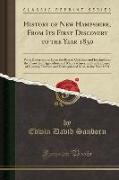History of New Hampshire, From Its First Discovery to the Year 1830
BücherAngebote / Angebote:
Excerpt from History of New Hampshire, From Its First Discovery to the Year 1830: With Dissertations Upon the Rise of Opinions and Institutions, the Growth of Agriculture and Manufactures, and the Influence of Leading Families and Distinguished Men, to the Year 1874
The best historian is he who represents with the greatest fidelity the life and spirit of the age he describes. It is not sufficient that what he records should be true "for substance, " it should be relatively as well as absolutely true. "History, " says Cicero, "is the light of truth." As truth is immutable, we should naturally infer that an impartial historian, like Thucydides, might write "for eternity, " but, while the facts of the past remain unchanged, the opinions of succeeding generations concerning them are modified by the progress of knowledge. Hence all history needs frequent revision. The oldest records receive the severest criticism. The study of the Sanscrit language has shed a flood of light on the affinities and migrations of early nations. The mythologies and traditions which connect the Orient with the Occident have fallen before the victorious march of comparative philology. The interpretation of the Rosetta stone, the Ninevite slabs and the Babylonian cylinders has restored the lost records of Egypt and Mesopotamia. The labors of Champollion, Lepsius, Layard, Rawlinson, Smith and Cesnola have made monumental records more valuable than existing history. Every generation receives a new version of old traditions respecting classic lands. Greece and Rome often appear in a new dress, and the public approves of these antiquarian researches. Modern history is subjected to the same searching analysis. Readers of the present day are not satisfied with the estimate which historians have placed upon the English, French and American Revolutions. The motives of men are now deemed better indices of character than their actions. The progress of nations depends more upon opinions and institutions than upon sieges and battles. The camp and the court yield to the imperial sway of new ideas. The rise of Puritanism, in the age of Elizabeth, left a deeper impression upon English history than the dispersion of the Spanish Armada. The rise of Methodism better deserved the notice of the annalist than the battles of Marlborough.
About the Publisher
Forgotten Books publishes hundreds of thousands of rare and classic books. Find more at www.forgottenbooks.com
This book is a reproduction of an important historical work. Forgotten Books uses state-of-the-art technology to digitally reconstruct the work, preserving the original format whilst repairing imperfections present in the aged copy. In rare cases, an imperfection in the original, such as a blemish or missing page, may be replicated in our edition. We do, however, repair the vast majority of imperfections successfully, any imperfections that remain are intentionally left to preserve the state of such historical works.
Folgt in ca. 5 Arbeitstagen




